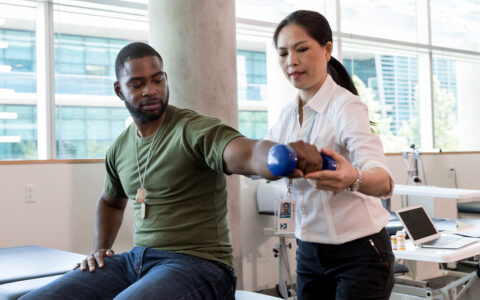The Coworker Observation Reporting System (CORS) encourages medical professionals to speak up about their colleagues’ unprofessional behavior, either at the moment it occurs or through feedback delivered later by a trained peer.
Years of research by the Vanderbilt Health Center for Patient and Professional Advocacy have shown that the vast majority of people self-correct their behavior without receiving formal intervention.
In the latest CORS research, a multi-site pilot validated the CORS’ success with nurses. A subsequent study detailed the nuances of working with collective bargaining units (CBUs) and human resources staff to implement the CORS tool bundle and process, highlighting an emphasis on communication, collaboration, consistency, and shared organizational values.
“We found that in implementing CORS with nurses, ongoing communication with our human-resources and collective-bargaining contacts was imperative,” said Cindy Baldwin, M.S., R.N., study author and CPPA faculty. “As with anything in health care, communication is key. Without it, people feel like it’s something that’s done to them instead of with them.”
Co-author Alice M. Krumm, D.N.P., R.N., director of partner engagement and faculty at the Center for Patient and Professional Advocacy, agreed.
“Everyone wanted to create a culture where nurses have the ability to speak up because they have a sense of psychological safety,” Krumm said. “We all believe in self-governance and autonomy as drivers of excellence and innovation in nursing practice.”
Linking Professionalism to Patient Outcomes
The Center for Patient and Professional Advocacy is home to 40-plus years of research linking professionalism in the clinical environment to a range of impacts, including patient safety and satisfaction, malpractice payouts, and clinician burnout. Problems linked to unprofessional and disruptive behavior in health care are widespread and have significant impact at both the individual and organizational level.
“As with anything in health care, communication is key. Without it, people feel like it’s something that’s done to them instead of with them.”
Building on this research, the Center initially launched a patient-reporting system, followed in 2013 by CORS, the coworker reporting program. They have proven complementary in promoting a safe and just culture. CORS has touched more than 100,000 physicians, advanced practice professionals, nurses, and academicians/researchers. Its peer-feedback model has been associated with an 87 percent self-correction rate following feedback.
CORS is both a tool and a process, Krumm said. The tool involves collecting data and generating reports about professional behavior, paired with benchmarking for peer standards. The process hones best practices for collecting and sharing this data, guided by what CORS terms the “professionalism pyramid” – a tiered intervention model to provide the right level of conversation at the right time.
Studying CORS’ Impact Among Nurses
Given CORS’ previous success, Baldwin and Krumm set out to investigate its effectiveness for nurses and how best to implement it a setting where about 10 percent of registered nurses nationwide belong to collective bargaining units or unions.
Vanderbilt University Medical Center also has status as a Magnet-designated hospital, which denotes quality patient care, nursing excellence, and a culture of innovation in nursing as recognized by the American Nurses Credentialing Center. Part of the investigation looked at whether bargaining units and institutions aiming to maintain Magnet status could find shared goals for CORS.
Piloting CORS at Three Sites
The pilot was conducted at VUMC, University of Iowa Health Care, and Keck Medicine of the University of Southern California. The study team found that the CORS tool bundle and overall process could be implemented for nurses without any major changes. They did note, however, that certain logistical realities must be considered.
“We had to account for the fact that nurses work 24/7,” Krumm said. “Additionally, CORS emphasizes that the feedback should come from a peer – not someone who is above or below you – and that it is someone who has a working knowledge of your specialty area. Given how specialized nursing is, this presented challenges. We had to do our due diligence to identify and train strategically placed peers to fill these needs and find ways to work around the potential shift issues.”
Working with CBUs and HR
Baldwin pointed to years of Center data showing a 95 percent self-correction rate after peer intervention. For people with more persistent patterns, a peer conversation plus data showing how they differ from their peers results in an 87 percent self-correction rate.
“Those numbers are incredible, because we haven’t done anything except share what others are observing, and health care professionals go on to reflect and self-correct,” Baldwin said.
Next Steps
Since the timeframes documented in the studies, the Center for Patient and Professional Responsibility has spread CORS among nurses at all Vanderbilt Health regional hospitals and clinics. The Center will continue to study CORS and its use at other hospitals and among different professional groups.
For Baldwin, however, it’s not just the geographical footprint that signals the program’s success. She sees every successful intervention as building a better professional culture centered around patient safety and VUMC’s credo.
“Now, we’ll hear people say things like the person ‘displayed non-credo values,’” Baldwin said. “That’s powerful. That’s everyone coming together to create a culture where we’re all here for the same thing, not to just get the job done, but to really treat everyone with respect and dignity. That’s really how this work got started, and it’s wonderful to see it coming true.”





